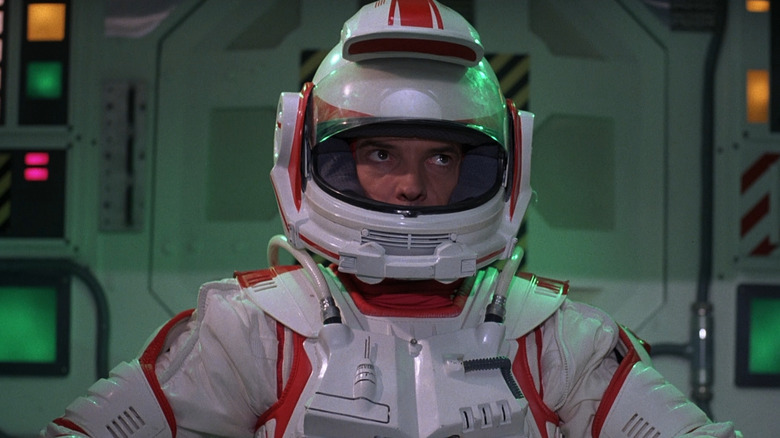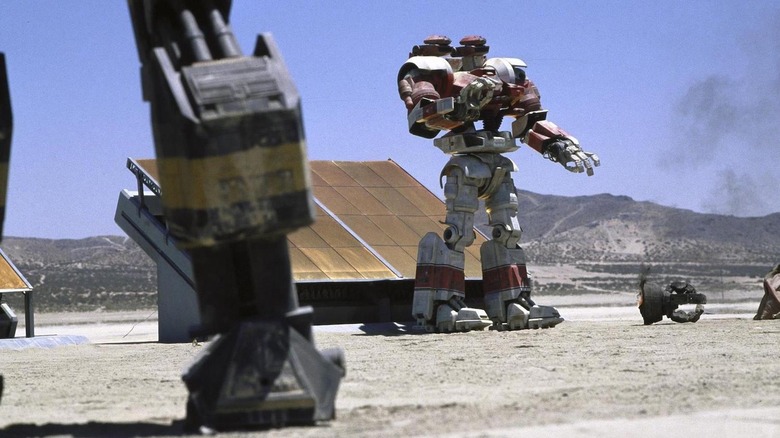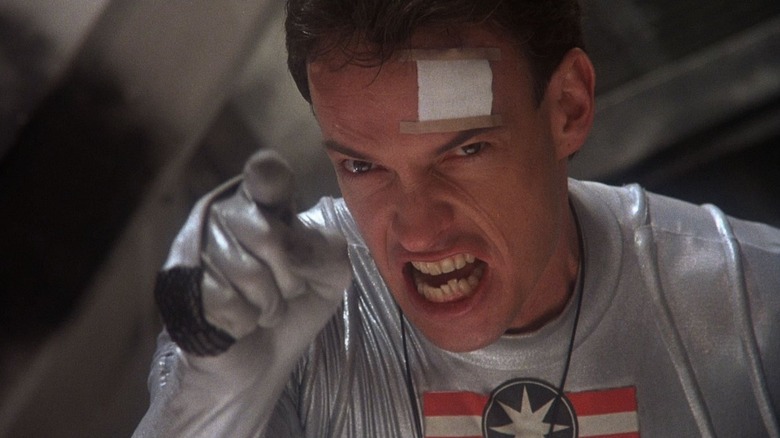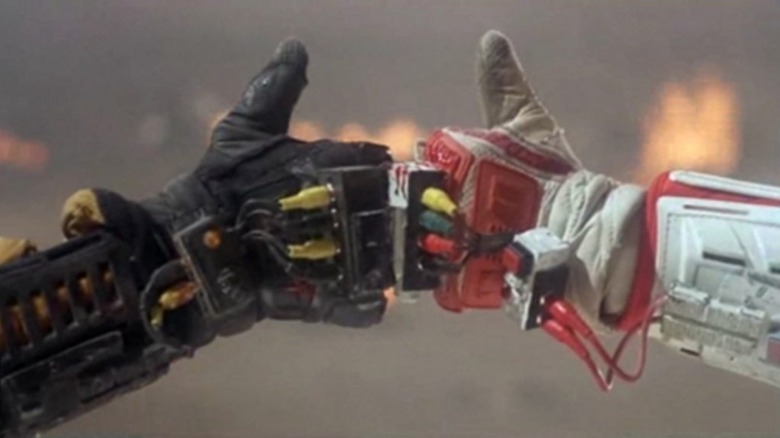The Daily Stream: Crash And Burn With Robot Jox
(Welcome to The Daily Stream, an ongoing series in which the /Film team shares what they've been watching, why it's worth checking out, and where you can stream it.)
The Movie: Robot Jox
Where You Can Stream It: Tubi, Pluto TV
The Pitch: The premise of Stuart Gordon's exciting dystopian epic is quite simple. Earth has barely survived a nuclear holocaust. 50 years later, Earth has managed to shakily rebuild by outlawing all manner of armed international conflict. War is illegal. To settle any disputes between nations, countries engage in one-on-one giant robot fights. A representative from each country will pilot their 10-story-tall robotic warrior, each equipped with specialized weapons, and wail on each other until one pilot submits. The pilots, called robot jox, are specially trained 24 hours a day and given star treatment by society. There is also a vast network of spying and espionage in the world of robot jox, as countries constantly seek to uncover one another's robo-weapon secrets.
"Robot Jox" is, as one might glean from the premise, a glorious pulp entertainment. Its raison d'être is clearly to allow its studio, Empire Pictures, to envision some pretty impressive robot fight scenes and lure in little boys with the promise of laser blasts, tank treads, and flying robot fist rockets. What Gordon provided, however, was the best possible version of it. The film is bright and slick and does a heck of a lot with a small budget. Online sources list the budget for "Robot Jox" at $10 million, although Gordon has said in interviews that it was actually closer to $6.5 million. Even for 1990, that was pretty minuscule.
The bare elegance of giant robots
The plot of "Robot Jox" is just as elegant and pulp-ready as its premise. Celebrity jock Achilles (Gary Graham) worked for The Market, and he is concerned that the new class of jox — represented by Athena (Anne-Marie Johnson) — is too mechanical and ambitious to his liking. He prefers working by gut instinct rather than training and studying. Achilles' professional rival is the aggressive Alexander (Paul Koslo), a robot jock for The Confederation. Achilles is ousted from the robot jox community when he uses his body to protect the bleachers of fans from being struck by Alexander's robot projectile, falling backward, and killing many by accident. The incident is mixed in with a conspiracy to leak information to the Confederation via a secret mole.
There are no big plot surprises in "Robot Jox," but one can certainly credit screenwriter Joe Haldeman for his efficiency and clarity., and the film's enthusiasm for robot mayhem; the climax is a massive robot fight that takes place partly in space. Every Saturday afternoon fantasy of a 9-year-old comes to stop-motion life in "Robot Jox."
More impressive, though, was director Stuart Gordon's ability to build out the dystopian world of "Robot Jox." Although little is said in dialogue, there appear to be numerous societal crises still at play in the background. Throughout the film, characters walk past propaganda posters encouraging women to "do their part" and get pregnant. Later on, a pregnant woman repeats the slogan. There appears to be a concerted governmental effort to repopulate the world. This information is presented completely as incidental. After all, not everyone in the present is constantly providing one another with descriptive exposition about the state of the world, and people in the future wouldn't either.
The details of dystopia
In that same scene, it is announced that dinner — by a great blessing — consists of "meat." The meat in question is a single hot dog. There is also, it seems, a massive food shortage as well. Although the world of robot jox is exciting and high-tech, Stuart Gordon allows the world to be ramshackle and uncomfortable and poverty-stricken. Throughout "Robot Jox," the action cuts to a crowd of civilians (including frequent Gordon collaborator Jeffrey Combs) who are gathered in a crowded, poorly maintained public square to watch the robot fights on a large TV. It's implied that all these people are homeless, and they make money by betting on the fights. The robot fights are cool and all, but there is a strangely intense analysis of what a world would look like during a period of restoration.
It also eschews war in favor of robot fights, giving it an edge of philosophical pacifism.
The film's stop-motion animation was provided by David W. Allen, one of the special effects masters born of the Criterion-backed 1970 monster movie "Equinox." One of Allen's first major gigs was designing and animating Nessuahyrrah (Harryhausen backward), a.k.a. The Great God Porno in the 1974 X-rated spoof flick "Flesh Gordon." Allen also worked on films like "The Howling," "The Hunger," "Twilight Zone: The Movie," "Ghostbusters II," "Willow" and several of Larry Cohen's films. Allen's monsters and robots always had an "afternoon matinee" quality, making them monstrous and exciting more than hefty or realistic. The actual volume of robot footage in "Robot Jox" is minimal, but it's so impressive that one leaves the film thinking that it took up a lot more time than it actually did.
Sadly, Allen passed away in 1999 at the age of 54. He is dearly missed.
Crash and burn
"Robot Jox" was the first film in what might be considered an unofficial series of movies, all made around the same time. In September of 1990, Charles Band, the luminary behind Full Moon Features, created his own dystopian robot film called "Crash and Burn," a phrase that the robot jox use as an affectional appellation. Outside of the United States, "Crash and Burn" was released as "Robot Jox 2," despite having little to do with Stuart Gordon's film other than the presence of giant robot suits piloted by single humans. Albert Band, Charles' brother, also took a swing at the series in 1993 with "Robot Wars," a goofy, cheap film that was once featured on "Mystery Science Theater 3000." That film, set in 2041, saw a group of tourists visiting a small town that, wouldn't you know it, just happens to look like a little sleepy California town in 1993.
The influence of "Robot Jox" continues to this day, however. While the idea of a giant robot handily predates Gordon's film — anime, Godzilla, and other Japanese tokusatsu shows were exploiting that notion for decades prior — modern giant robot media likely owes it a debt. Many "Jox" fans, for instance, noticed the similarities between it and Guillermo Del Toro's 2014 sci-fi flick "Pacific Rim," a film about giant robots, each piloted by a pair of humans, fighting an invading force of giant monsters. Closer in spirit to "Jox," though, might be its 2018 sequel "Pacific Rim Uprising."
For my money, though, "Robot Jox" stands above them both. In terms of enjoyable, kiddie matinee fluff, one can't get much better.



